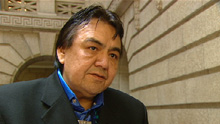CBC News
June 15, 2010
http://www.cbc.ca/canada/manitoba/story/2010/06/15/man-trc-eric-robinson-background.html
 |
| Manitoba deputy premier Eric Robinson will share his own family's story of residential schools abuse before the Truth and Reconciliation Commission. Manitoba deputy premier Eric Robinson will share his own family's story of residential schools abuse before the Truth and Reconciliation Commission. (CBC) |
Manitoba deputy premier Eric Robinson knows first-hand what it meant to be a student at an Indian residential school.
He counts himself lucky he spent only three years at the Jack River School in Norway House, Man., though he was there long enough to be sexually abused by a priest.
"I was one of the fortunate ones."
His parents, he says, were not so lucky.
"My father was a student at one of these places, went there for seven or eight years, never learned anything more than how to write his name, but he sure became a good farmhand.
"My mother went ... at the age of three. She came out when she was 18 to a world of alcoholism and drug abuse and she died alone on the streets of Winnipeg at the age of 31 when I was 11 years old."
Commission part of settlement
Robinson will be one of many survivors taking part Wednesday in the first national hearing of the Truth and Reconciliation Commission, in Winnipeg, when it begins to expose and deal with the pain and suffering caused by residential schools.
About 150,000 First Nations, Inuit and Metis children were forced to attend the government- and church-run schools over much of the last century. The last one closed outside Regina in 1996 and about 85,000 former students are still living.
The $60-million commission was part of a landmark deal reached with residential school survivors who had filed a class-action lawsuit against the federal government and the churches.
It's getting a late start after stumbling out of the blocks, but Robinson says that doesn't matter because its work is important and all Canadians need to know what happened.
Aboriginal leaders say it's a massive undertaking and one that the commission alone probably can't accomplish.
"We don't know exactly where this is going to go," said Wayne Spear of the Aboriginal Healing Foundation, set up more than 10 years ago to provide direct help to residential school survivors.
"It depends on what people have to say and the directions participants take."
It's important that it produce something lasting and meaningful, Spear said. His foundation's funding will run out and it will finish its work in 2012, but up to March it was running 135 projects and 12 healing centres across the country.
1st attempt fumbles
The Truth and Reconciliation Commission was relaunched almost exactly a year ago under Murray Sinclair, the first member of a Manitoba First Nation to become a judge.
Its work was stalled when its first leader, Ontario Appeal Court Justice Harry LaForme, quit after accusing his co-commissioners of undermining his authority. Claudette Dumont-Smith and Jane Brewin Morley also resigned.
The commissioners couldn't agree whether reconciliation or historical documentation should be at the heart of their mandate.
Ottawa extended the commission's timeline by one year to make up for the delays. It plans seven national meetings to collect stories from former students and is expected to finish its work by 2014.
Sinclair is an old hand at government-sponsored inquiries. Two decades ago he was co-author of a voluminous two-part report on how aboriginal people are mistreated by the justice system in Manitoba.
He also headed an investigation into pediatric heart deaths at Winnipeg Children's Hospital in 1994.
Sinclair is working with the aid of co-commissioners Marie Wilson, a former CBC North executive, and Wilton (Willie) Littlechild, a lawyer, former MP and Alberta vice-chief of the Assembly of First Nations.
Unhappiness over cost
There are those in the survivor community who remain skeptical of the commission's work and resent the use of money they say should be going directly to them.
Tony Cote, 75, says he never forgot the bitterness of his experience at a residential school in Saskatchewan.
"There was no love, no care, no nothing in those places ... all we ever did was pray and sing hymns. We never did really learn anything."
He is afraid money is being wasted on bureaucratic things such as the commission and offices set up to aid survivors.
"They're all drawing good wages. Us survivors are still suffering."
Any original material on these pages is copyright © BishopAccountability.org 2004. Reproduce freely with attribution.